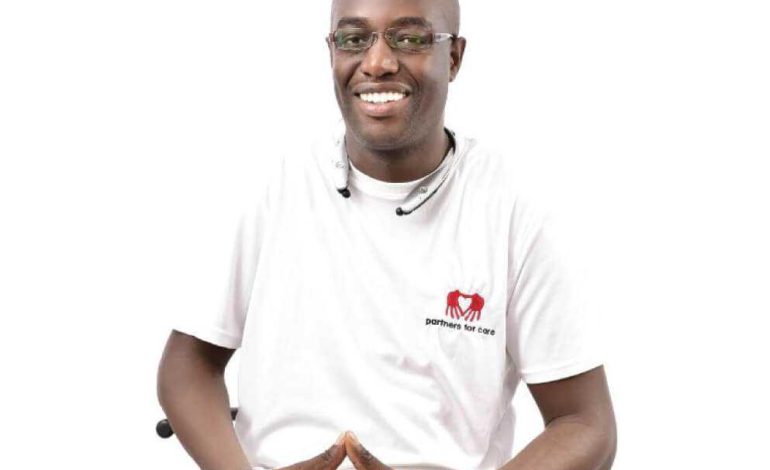SAMMY WANJAU UPLIFTING THE LIVES OF THE NEEDY
When Sammy Wanjau was growing up in the outskirts of Eldoret town, he dreamt of becoming a musician. His dream came true as he went on to sing his heart

When Sammy Wanjau was growing up in the outskirts of Eldoret town, he dreamt of
becoming a musician. His dream came true as he went on to sing his heart out. His love for music started when he was very young hence he learnt how to play almost all kinds of musical instruments at a tender age.
“I am passionate about music and in order to succeed in the musical world I had to practice my vocals as I believed in the saying that practice makes perfect,” he says adding that his local church then offered him the perfect ambience to develop his talent.
According to Sammy, while his age mates were busy reveling in childhood games, he was in church practicing. In the process, he grew attached to the church and it became an integral part of his life.
Sammy, a third-born in a family of four, was so determined to minister through gospel songs and just as his music ministry was taking shape, the country was hit by the 2007/2008 post-election violence forcing his family to relocate from Eldoret to Naivasha town, ultimately throwing his plans into disarray.
Not one to sit down and watch violence prevail, Sammy decided to do something – advocate for peace through music. He started a band and they went round visiting the affected areas in Rift Valley. They ministered through songs with an aim of healing the bleeding hearts.
“We ministered mainly in churches with the hope that the songs would sow the spirit of reconciliation among the warring communities,” says Sammy.
Plunge into the humanitarian world…
It was during this noble mission that Sammy’s team met Connie Cheren – a social worker and nurse from the United States of America who was visiting the country.
Sammy’s ministry of healing the bleeding nation touched Connie and she promised to partner with the team to advocate for peace as well as improve lives of Kenyans. It is here that Partners for Care Kenya was born.
Partners for Care is a compassion driven and non-profit organisation with the goal of eliminating needless suffering and death caused by preventable diseases including malaria, HIV/AIDS, waterborne illnesses and malnutrition.
“When Connie came on board, we were able to not only just sing, but also provide basic needs to those affected by the post-election violence. After the chaos, we helped the affected families to collect pieces of their lives and start life afresh,” explains Sammy.
After helping the post-election violence victims to settle, they channeled their energy to people living with HIV/ AIDS through provision of antiretroviral drugs, offering guidance and counselling support and speaking to youths on the importance of abstaining from sexual intercourse till marriage, or practicing safe sex.
“We realised that HIV was a big epidemic in the country and it had affected most families. We therefore had to devise a strategy of helping the affected as well as working towards eliminating it,” he notes.
In 2009, the team learnt that the mortality rate in Kenya was high due to HIV, malnutrition and lack of clean water.
This saw them start initiating programmes to arrest the situation such as creating awareness on healthy lifestyle habits. At the same time, they started working towards helping people from nomadic communities to access education.
“People think that every Kenyan child can access education but you will be surprised to learn that majority of children from nomadic communities are not attending school,” he says adding that they are currently sponsoring 27 morans (young men regarded as warriors among the Maasai and Samburu communities) in different schools. Sammy adds that education is key in setting people free from any kind of bondage and Partners for Care thus advocates for education for all.
The organisation is also fighting against waterborne disease through the water backpack project. The packH2O water backpack provides a solution for transporting and storing safe water thereby reducing the impact of waterborne pathogens that lead to illness.
The product is lightweight and features a liner that can be sanitised by sunlight. It serves both residential and commercial needs and is less expensive. The organisation has so far distributed over 20,000 water backpacks in Kenya.
Helping widows earn a living…
Due to the large number of widows in the country, Partners for Care has programmes to empower them economically. As such, the organisation carry out farming on rented lands in partnership with a group of widows.
The widows are then given part of the harvest while the rest is sold to the local community at subsidised rates. So far, the farming programme has been carried out in Marsabit and Nakuru County.
According to Sammy, many African cultures don’t give much thought to widows with some even being disinherited and chased away from their matrimonial homes, making it hard for such women to feed their children leave alone educating them. It is from this point of view that Partners for Care helps such women to find a genuine income through hard work as opposed to being given handouts.
“We also have a posho mill in Marsabit that helps residents to grind their maize, millet and other grains at subsidised price. The posho mill, which is run by the locals, also saves them from walking miles for such service,” Sammy points out.
Partners for Care is active in five counties namely Siaya, Kiambu, Nairobi, Marsabit and Nakuru.
“Before we start a centre in any county, we first identify a need and have a partner who is willing to support our cause. For instance, we partnered with Marsabit County to renovate the Marsabit District Hospital and we even gave them new equipment,” says Sammy who believes in the mantra never do for others what they can do for themselves.
“We also partner with churches and schools to offer computer studies in schools,” he adds.
Not without challenges…
Sammy points out finances as one of their main challenges where they sometimes find themselves unable to fully meet their objectives.
“There is so much we would wish to do for the community but our hands are financially tied. For instance, we identified a children’s home for children living with disability and all we can do is provide wheelchairs because our budget couldn’t allow us to go beyond that,” he says.
Sammy also points lack of goodwill from other stakeholders such as the government.
According to him, they sometimes get discouraged when they learn of mega corruption going on in the government yet the masses are suffering. However, they purposed to remain focussed on their main goal, which is to offer better services to the needy.
“The fact that there are some evils going on in the government perpetuated by the people who are supposed to serve Kenyans doesn’t deter us from our main focus. We are cognisant of the fact that just as there are corrupt officers in the government, there are also good people in the same government who we can work with,” he says.
The team’s main focus is on education and health since these are the backbones of any economy. They also believe that a country’s success can only happen when the people adequately prepare and work for it hence the need to empower everyone.
“We have cases of people who joined us when they were not able to read and write but after joining the organisation, they have been taught how to do it and today they are doing well in business,” he says sampling some of the organisation’s success stories.
According to Connie Cheren who was present during the interview, you can only live life fully when you complete your purpose. Connie believes in giving everyone a chance to realise their potential.
“There is nothing satisfying like serving people. It gives you a reason to live,” she says.
Connie notes that Africans are not in need of handouts but in need of people to partner with them. Since its inception, Partners for Care has grown in numbers and types of programmes it supports. The organisation has presently employed a staff of 40.
“Our vision is for every child to have the opportunity to live and to have enough food to eat, attend school, and grow up healthy,” says Connie in conclusion.
kahara@parents.co.ke




